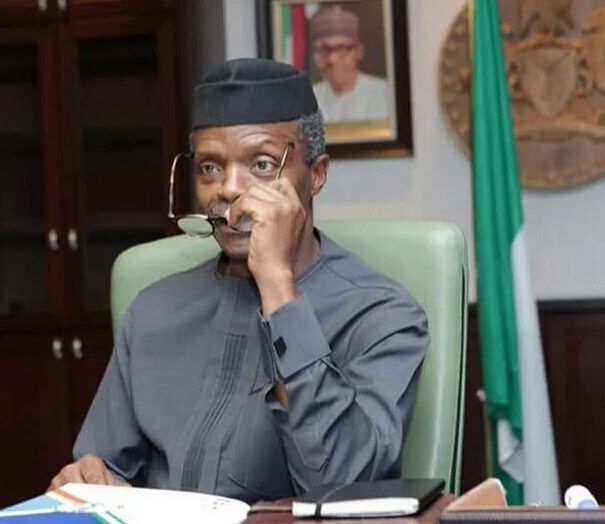
Oluwani Akintayo
Lagos — The recent drive by especially International Oil Companies, IOCs to move to cleaner sources of energy has driven investments in fossil fuel in Nigeria down by 40% since 2015.
This is true, as revealed by Vice President, Yemi Osinbajo at a conference held over the weekend.
Low investments in fossil fuel which contributes 83 percent of primary energy demand in the country has become a source of concern to the federal government, especially since withdrawal is not commensurate with investments in renewable energy to support the country’s intended accelerated transition from fossil fuels.
He said, “The risks of trying to make 30-year commitments to reaching net-zero were plain and apparent for all to see. The Economist reported that since May the combined prices of oil, coal and gas increased by 95 per cent. It was also reported that Britain has turned back on some coal-fired power stations.
“I surely believe that the energy transition was not meant to make energy less available and unaffordable. These events if not handled carefully may turn global public sentiment against climate change policies.”
The race is becoming tougher, as IOCs and few National Oil Companies, NOCs such as Seplat have since flagged off transition plans into full-fledged energy companies, including name changes.
Shell Petroleum Development Company of Nigeria Ltd, SPDC, already moved to divest its equity from some oil blocs in the Niger Delta region.
Others, including ExxonMobil, Chevron, BP, Total, Shell, and ConocoPhillips are planning to sell assets worth $27.5 billion in a bid to invest in new regions, according to research by Rystad Energy.
Many projects initiated in Nigeria’s oil sector have remained at the planning stage even after several years. Some of the projects include Shell’s Bonga South-West and Aparo, which is expected to add about 225,000 barrel per day (bpd); Bonga North (100,000bpd); Eni’s Zabazaba-Etan (120,000bpd); Chevron’s Nsiko (100,000bpd); ExxonMobil’s Bosi (140,000bpd); Satellite Field Development Phase Two (80,000bpd) and Ude (110,000bpd). These projects are estimated to cost around $100 billion, with the capacity to boost the nation’s production by as high as 875,000 bpd and revenue by about $1.5 billion.
Also mired in uncertainty are the $20 billion Brass LNG project in Bayelsa State; the $9.8 billion Olokola LNG in Ogun; the 5000km Nigeria-Morocco offshore gas pipeline, which in the current market price would cost an estimated $20 billion.
As a result of low investments, oil-based economies, Nigeria being one, have since taken up the challenge to campaign against a one-way traffic to energy transition, insisting that gas should be included as one of the transitional fuels.
Secretary-General of the Organization of the Petroleum Exporting Countries, OPEC, Mohammed Barkindo, last week practically held IOCs at the jugular when he called on developing countries to hold developed countries responsible for climate change. He insisted that developed countries must pay Africa $100 million yearly promise.
Barkindo had also opened the eyes of developing countries to many other available funds including the Global Environment Facility, Special Climate Change Fund, Least Developed Countries Fund, Green Climate Fund and the Adaptation Fund, saying the accounts should be fully funded and disbursed in a timely and predictable manner in accordance with the provisions of the United Nations Framework Convention on Climate Change , UNFCCC and the Paris Agreement .
African countries who still believe that fossil fuels should be part of the future energy mix, have kept advocating for inclusion, and have decided to take the debate to the UN Climate Change Conference, COP26 to be held from October 31 to November 12.
There have been several meetings in recent weeks, all geared towards influencing negotiations at the next COP26 meeting. These include the pre-cop in Italy and the High-Level Dialogue on Energy, held at the UN General Assembly in September. Additionally, the US also hosted a forum announcing initiatives on emissions. The G20 Summit and International Monetary Fund and World Bank meetings are expected to also take place before the COP26. Various events are also being hosted by Conference of the Parties, COP Presidencies.
“We cannot execute this transition without gas. This particularly impacts Nigeria as in some respects we are more of a gas country than even oil. DPR reported in June that we have 207 trillion cubic feet of proven gas reserves. The world cannot move to electric cars overnight, the world cannot expand renewables without stable baseload. Gas enables this transition with options for auto gas on vehicles and even more importantly gas power to replace dirty coal plants across the world.
“Gas is cleaner than coal or oil and initially was touted as a critical transition fuel. Later, climate change policy (particularly in the West) began to turn against gas with very strict policies from many lenders against even funding upstream, midstream or downstream Gas projects. This has created the proverbial “Chickens coming home to roost” scenario we face today with insufficient gas investment without commiserate replacement by renewables leading to scarcity and high prices.”Osinbajo said, adding that the federal government would also be driving a conversation on the “Just Transition” at the COP-26 conference.
Paris-based International Energy Agency, IEA demands that zero emissions from electricity generation in rich countries by 2035, and the rest of the world by 2050 be achieved. Some of the keys to achieving this, the IEA said, would be unparalleled investment in renewable and clean energy, an end to the sale of new internal combustion engine passenger cars by 2035, a four-fold increase in the deployment of solar and wind power by 2030, unprecedented levels of international cooperation between governments; and adoption of ‘no new oil and gas fields approved for development’ and ‘no new coal mines or mine extensions.’
As a result, several countries, including the United States and the European Union, have pledged to achieve net-zero emissions, and are racing towards meeting the target.
Researchers at the IEA had insisted that even if current climate pledges by global governments, including Nigeria were achieved, the world would still fall short of bringing energy-related carbon dioxide emissions to net zero by 2050.
For the global commitment to become feasible, the agency, therefore, noted that there must not be an investment in new fossil fuel supply projects and no further final investment decisions for new unabated coal plants.
With such development, the IEA forecasts gas demand would decline by 55 percent to 1.75 trillio



